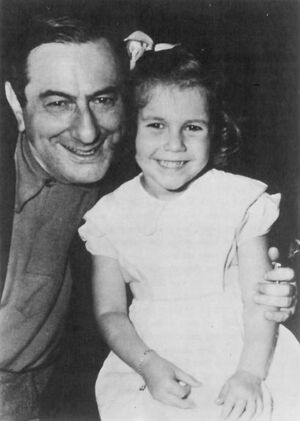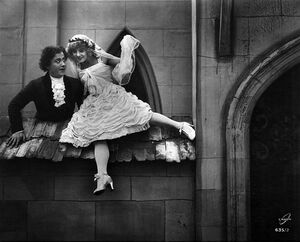Villa Aurora Events Archive
July 2018
Silent Salon 2018
Villa Aurora (520 Paseo Miramar, Los Angeles, CA 90272)

Information
Following the Silent Film Special of THE ANCIENT LAW (by E.A. Dupont) on June 5th, we will honor Ernst Lubitsch featuring four of his lesser known German comedies.
Ernst Lubitsch arrived in Hollywood in 1922. He was 30 years old. He soon achieved fame for his class comedies, expressing the unspeakable with a twinkle in the eye, clever editing and suggestive dialogue making any and all attempts at censorship impossible.
The German Lubitsch is less widely known, however, his more sweeping comedic effects are well-worth rediscovering. THE OYSTER PRINCESS (1919) already foreshadowed America. One inter-title reads "Das imponiert mir gar nicht" ("I am not impressed") tossing barbs at the country’s nouveau-riches. The slightly earlier I DON’T WANT TO BE A MAN (1918) stuns with a cross-dressing-plot anticipating the "anything goes" atmosphere of the "sin city" of Berlin in the 20s. THE DOLL (1919) comes across like a Punch and Judy Show, rife with paper decor and earthy comedic effects. And last but not least THE MOUNTAIN CAT (1921). The film is a satire on militarism where everything, from the camera to the props go crazy. After Germany’s loss in WW1, this masterful film was no success then, but today it is more enjoyable than ever, also due to the fact, that Pola Negri, who later played Hollywod’s statutory vamp, was able to prove her comedic talent. (Martin Koerber, Deutsche Kinemathek, Berlin)
We would like to thank The Stiftung Deutsche Kinemathek for their support. “Before the Lubitsch Touch” was curated by Martin Koerber, Head of Audiovisual Heritage - Film of the Deutsche Kinemathek - Museum für Film und Fernsehen.
June 5: Silent Film Special
July 7: Before the Lubitsch Touch #1
July 28: Before the Lubitsch Touch #2
August 18: Before the Lubitsch Touch #3

DOUBLE FEATURE
THE OYSTERPRINCESS (Die Austernprinzessin)
(Germany, 1919, 47 min., starring Ossi Oswalda, Harry Liedtke, Victor Janson and Julius Falkenstein)
The tale of an heiress to a fortune, who wants to marry a real-life prince. Her father, eager to please her, sends for Prince Nucki, who, instead of answering the call, sends his friend Josef to check things out.
“This film is characteristic of what would be called later “The Lubitsch Touch” a ritualization of breaches of sexual or social property in an unexpected and absurd way” (A Cinema History)
I DON'T WANT TO BE A MAN (Ich möchte kein Mann sein)
(Germany, 1919, 44 min. starring Ossi Oswalde)
“This film is a sprightly examination of an adventurous young woman posing as a man for a day. Precociously challenging social and sexual status-quo politics that don’t seem all that alien today, it’s a revitalized artifact that functions just as well as a saucy romp.” (Guy Lodge, The Observer, July 2015)
Participant

Introduction by daughter of the filmmaker Nicola Lubitsch!
Screening・Stefan Zweig: Farewell to Europe
Los Angeles
Information

Dir. Maria Schrader, Germany, 2015/16, 106 min, color, digital
In her haunting and subtly contemporary film, starring Josef Hader, Maria Schrader follows Austrian-Jewish writer Stefan Zweig's move from Europe into his South-American exile.
There is a banquet given in his honor in Rio, he takes part at the P.E.N.Congress in Buenos Aries, and spends some time in New York. In the fall of 1941 he and his wife Lotte settle in the Brazilian city of Petropolis. This is where he finishes his famous "The Royal Game" (Schachnovelle). In early 1942 the couple commits suicide.
STEFAN ZWEIG: FAREWELL TO EUROPE was Austria's entry for the 2018 Academy Awards and won the People's Choice Award for Best European Movie at the 2017 European Film Awards. The film was released theatrically in over 15 countries.
Maria Schrader is one of Germany's most acclaimed filmmakers and actresses. Two-time winner of the German Film Award and three-time winner of the Bavarian Film Award, she has worked with directors such as Margarethe von Trotta, Doris Dörrie, Peter Greenaway and Agnieszka Holland ("In Darkness"). She was awarded the Berlinale's Silver Bear as Best Actress in "Aimée & Jaguar" by Max Färberböck, which was nominated for the Golden Globes in 2000.
As an actress Maria Schrader recently appeared in the renowned series "Deutschland 83" (International Emmy for Best Series in 2016) as well as the BBC's "The City and The City". At Villa Aurora Maria Schrader is working on a new directing project.
Silent Salon 2018
Villa Aurora (520 Paseo Miramar, Los Angeles, CA 90272)

Information
Following the Silent Film Special of THE ANCIENT LAW (by E.A. Dupont) on June 5th, we will honor Ernst Lubitsch featuring four of his lesser known German comedies.
Ernst Lubitsch arrived in Hollywood in 1922. He was 30 years old. He soon achieved fame for his class comedies, expressing the unspeakable with a twinkle in the eye, clever editing and suggestive dialogue making any and all attempts at censorship impossible.
The German Lubitsch is less widely known, however, his more sweeping comedic effects are well-worth rediscovering. THE OYSTER PRINCESS (1919) already foreshadowed America. One inter-title reads "Das imponiert mir gar nicht" ("I am not impressed") tossing barbs at the country’s nouveau-riches. The slightly earlier I DON’T WANT TO BE A MAN (1918) stuns with a cross-dressing-plot anticipating the "anything goes" atmosphere of the "sin city" of Berlin in the 20s. THE DOLL (1919) comes across like a Punch and Judy Show, rife with paper decor and earthy comedic effects. And last but not least THE MOUNTAIN CAT (1921). The film is a satire on militarism where everything, from the camera to the props go crazy. After Germany’s loss in WW1, this masterful film was no success then, but today it is more enjoyable than ever, also due to the fact, that Pola Negri, who later played Hollywod’s statutory vamp, was able to prove her comedic talent. (Martin Koerber, Deutsche Kinemathek, Berlin)
We would like to thank The Stiftung Deutsche Kinemathek for their support. “Before the Lubitsch Touch” was curated by Martin Koerber, Head of Audiovisual Heritage - Film of the Deutsche Kinemathek - Museum für Film und Fernsehen.
June 5: Silent Film Special
July 7: Before the Lubitsch Touch #1
July 28: Before the Lubitsch Touch #2
August 18: Before the Lubitsch Touch #3

THE DOLL (Die Puppe)
(Germany, 1919, 66 min., starring Ossi Oswalda, Victor Janson and Ernst Lubitsch)
Baron de Chanterelle, afraid for his lineage, implores his nephew Lancelot to get married. Shy Lancelot, however, can’t deal with the onslaught of candidates, his uncle is recruiting and flees into a monastery. When the monks hear, that there is a dowry to be expected, they suggest to Lancelot to just marry a doll. After the wedding-ceremony the “bride” turns out to be much more alive than expected.
Participant

Introduction by daughter of the filmmaker Nicola Lubitsch!




